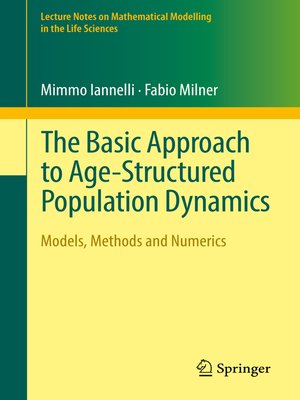The Basic Approach to Age-Structured Population Dynamics
ebook ∣ Models, Methods and Numerics · Lecture Notes on Mathematical Modelling in the Life Sciences
By Mimmo Iannelli

Sign up to save your library
With an OverDrive account, you can save your favorite libraries for at-a-glance information about availability. Find out more about OverDrive accounts.
Find this title in Libby, the library reading app by OverDrive.



Search for a digital library with this title
Title found at these libraries:
| Library Name | Distance |
|---|---|
| Loading... |
This book provides an introduction to age-structured population modeling which emphasizes the connection between mathematical theory and underlying biological assumptions.
Through the rigorous development of the linear theory and the nonlinear theory alongside numerics, the authors explore classical equations that describe the dynamics of certain ecological systems. Modeling aspects are discussed to show how relevant problems in the fields of demography, ecology and epidemiology can be formulated and treated within the theory. In particular, the book presents extensions of age-structured modeling to the spread of diseases and epidemics while also addressing the issue of regularity of solutions, the asymptotic behavior of solutions, and numerical approximation. With sections on transmission models, non-autonomous models and global dynamics, this book fills a gap in the literature on theoretical population dynamics.
The Basic Approach toAge-Structured Population Dynamics will appeal to graduate students and researchers in mathematical biology, epidemiology and demography who are interested in the systematic presentation of relevant models and mathematical methods.
Through the rigorous development of the linear theory and the nonlinear theory alongside numerics, the authors explore classical equations that describe the dynamics of certain ecological systems. Modeling aspects are discussed to show how relevant problems in the fields of demography, ecology and epidemiology can be formulated and treated within the theory. In particular, the book presents extensions of age-structured modeling to the spread of diseases and epidemics while also addressing the issue of regularity of solutions, the asymptotic behavior of solutions, and numerical approximation. With sections on transmission models, non-autonomous models and global dynamics, this book fills a gap in the literature on theoretical population dynamics.
The Basic Approach toAge-Structured Population Dynamics will appeal to graduate students and researchers in mathematical biology, epidemiology and demography who are interested in the systematic presentation of relevant models and mathematical methods.







